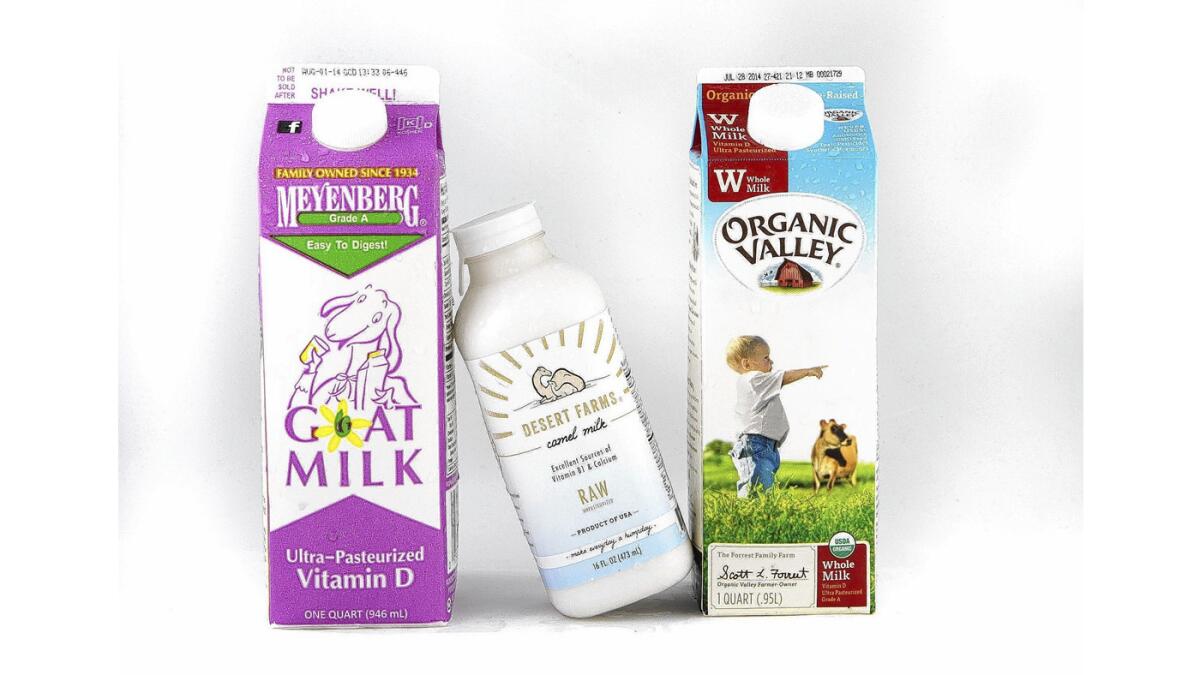Santa Monica firm sells camel’s milk as healthful, but pricey, drink

With a plastic white cap and powder blue label, the Desert Farms milk bottle matches the idyllic image of the doorstep milk bottle. But a closer look reveals something a bit different: “Make every day a humpday.”
It is the lighthearted slogan of America’s first retail camel’s milk company. Supplied by seven small camel farms, most of them owned by Amish, the Santa Monica-based company recently sold its 100,000th dollar of camel milk as it spreads its claims of nutritional and health benefits.
“What we know about the camel milk is that, in terms of health, it outperforms every other dairy beverage,” said Walid Abdul-Wahab, 23, who came up with the idea behind Desert Farms for a USC class project.
With no appreciable difference in taste from cow’s milk, camel’s milk has 50% less fat and about 40 fewer calories per cup. It also has about the same amounts of other nutrients. Desert Farms sells milk raw or pasteurized, with the pasteurized version in most stores.
But it doesn’t come cheap. A pint costs $16 to $19 online.
Abdul-Wahab’s project was inspired by a visit home to Saudi Arabia, where families consider camel’s milk a delicacy and drink it for celebrations as well as when they’re sick. After investing his own funds to launch in January, he now supplies camel’s milk to Lassens in Los Feliz and to Whole Foods stores in Northern California, in addition to selling it online.
“Camel milk has been used for centuries in the Middle East by nomads and Bedouins, and they swore by it,” he said. “That’s why people have faith in it — it’s a historical product.”
Abdul-Wahab said he wondered why it was not more widely available. But while researching his class project, he learned that some farms in the West and Midwest, mostly owned by Amish, milked camels. He approached them, and soon seven small farms began supplying milk for Desert Farms.
“The interaction was wonderful … something that we’re so proud of, and what we say on our bottles is that our milk not only helps customers but is also benefiting small American families sustained on camel milk sales,” Abdul-Wahab said.
Marlin Troyer, an Amish Mennonite farmer in Michigan, experimented with camel milk in 2010, and he credits the camel business for his farm’s growth from 10 acres to 80 acres in the last four years.
“Like many Amish, I drank every raw milk that there was out there, including horse’s milk, donkey milk and goat milk,” said Troyer, founder of the Camel Milk Assn. “So the Amish were willing to take the risk and have the work ethic that it takes to milk camels, which is a very hands-on, extremely labor-intensive process.”
Camels, Troyer said, refuse to be milked except by a couple of people they grow accustomed to, and their babies need to be nearby. In addition, according to Abdul-Wahab, cows outnumber camels by about 18,000 to 1 in the United States, making cow’s milk less pricey.
About 80% of Desert Farms’ sales so far have gone to parents of children with autism, because of the milk’s reputation for improving motor and executive functioning in their children.
“Nobody has tested camel’s milk scientifically,” said Dr. Jay Gargus, director of the UC Irvine Center for Autism Research and Translation. After partnering with Christina Adams, a writer who has reported success with camel milk and her own son, the Irvine labs began tests this month to “see if there’s some basis to it,” he said.
Whatever the results, Abdul-Wahab is optimistic that expansion will drive prices down and camel’s milk will appeal to health-conscious consumers. Desert Farms is also experimenting with camel milk cosmetics, yogurt, cheese and chocolates.
“Regardless of who [camel’s milk] has helped, it’s going to help everyone because it’s so wholesome and nutrient dense,” said Abdul-Wahab. “We see ourselves as being leaders and innovators not only in the camel industry, but we are trying to disrupt the dairy industry as a whole.”
::
Glass-to-glass milk comparison
This compares some attributes of 8 ounces of whole milk from cows, goats and camels.
Cow’s milk
Calories: 150
Total fat: 8 grams
Saturated fat: 5 g
Cholesterol: 30 milligrams
Protein: 8 g
Calcium: 30% of daily value
Vitamin A: 4%
Vitamin D: 25%
Goat’s milk
Calories: 140
Total Fat: 7 g
Saturated fat: 4 g
Cholesterol: 25 mg
Protein: 8 g
Calcium: 30% of daily value
Vitamin A: 6%
Vitamin D: 25%
Camel’s milk
Calories: 110
Total Fat: 4.5 g
Saturated fat: 3 g
Cholesterol: 15 mg
Protein: 5 g
Calcium: 30% of daily value
Vitamin A: 4%
Vitamin D: 6%
dashiell.young-saver@latimes.com



